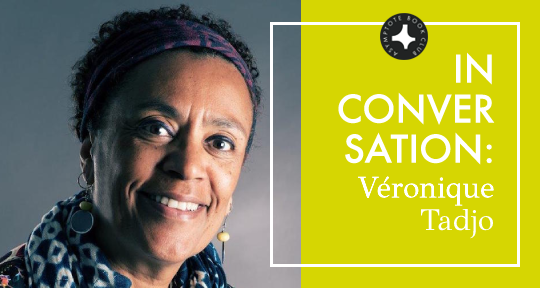In February, we introduced to Asymptote Book Club subscribers the multifarious, multivocal work of Véronique Tadjo. Her 2017 novel, In the Company of Men, fascinatingly combines document, and oration in a portrait of the West African Ebola epidemic, interrogating in turns how we as humans grapple with illness, as well as how the natural world—with its unseen forces—regards us. A pivotal read during this seemingly unending time of addressing our own pandemic, Tadjo’s unique linguistic style and sensitive artistry has introduced In the Company of Men as a text of both current relevance and long-lasting artistry. In this following interview, Assistant Managing Editor Lindsay Semel speaks with Tadjo on self-translation, personifying the non-human, and the inheritance of literary traditions.
The Asymptote Book Club aspires to bring the best in translated fiction every month to readers around the world. You can sign up to receive next month’s selection on our website for as little as USD15 per book; once you’re a member, you can join the online discussion on our Facebook page!
Lindsay Semel (LS): I’m fascinated by the subject of self-translation. You’ve translated some of your own children’s fiction, but this is your first foray into translating your adult fiction. Even though you’ve lived in so many different places, and you function daily in so many different languages, translating your own work is a separate beast. I’d love to hear about, first and foremost, what the process was like for you.
Véronique Tadjo (VT): Yes, I function in two languages, French and English; I’ve been studying English and living in Anglophone countries quite extensively—the longest was in South Africa for fourteen years. So I’m used to speaking both languages.
This process with In the Company of Men was fairly long, and it was a collaboration. It started with a draft with a friend; we worked quite a lot on the text, but the result was still very close to the French original. Maybe because I’ve done a lot of translation, I could see that myself—that there was something stalling the text. The last stage of the collaboration was with John Cullen from Other Press, a translator with a very good reputation. He looked at the text and finally lifted it up, in the sense that he was able to give it a more oral quality than the first version, which was a little bit wooden. I just didn’t feel that it was flowing the way it should flow, especially because English is a much more direct language [than French]. French tends to go round and round—it takes a bit more time to get there. Whereas English has some sort of efficiency. I think that the original French book was more lyrical, whereas the English translation is more to the point.
LS: Do you happen to have, off the top of your head, an example of a passage that wasn’t quite hitting its mark? Do you remember what changed through those conversations about it?
VT: Very simple things. Like, for example, “He’s a tall man.” You can’t do that in French. You can’t contract. It’s just a small example, but when you look on the page, how the language is written down, it makes a big difference.
LS: There are very clear parallels between the events that you chronicle in this text and what a lot of the globe is experiencing now collectively, and so I wonder if current events contributed to your decision to translate yourself rather than bringing in a translator. What was it like for you to put yourself back into this story?
VT: Yes, I think that because of the pandemic, I had a sense of urgency. I had it in 2017 when I was talking about the Ebola epidemic, but with the translation, it came back. This time, what we had feared was becoming reality, so there was a renewed sense of energy, which compelled me to want to be very involved in the translation—to really put myself fully in it.
There were certain words that came naturally which I sometimes had to resist. For example, there’s a chapter in which a nurse plays an important role. You would be tempted to call her an “essential worker.” But you have to be careful, because “essential worker” is an expression that has taken strength from the COVID-19 pandemic, but I’m not sure we were using it that much before. You see, today you read it differently. I didn’t want to introduce this “foreign language,” which would signal a shift from Ebola to COVID-19. It would not be right. So, although there was temptation to use some of the terms that are being used today, I didn’t want that contamination, in a sense. I had to stay true to the period, the time, and the context. READ MORE…


